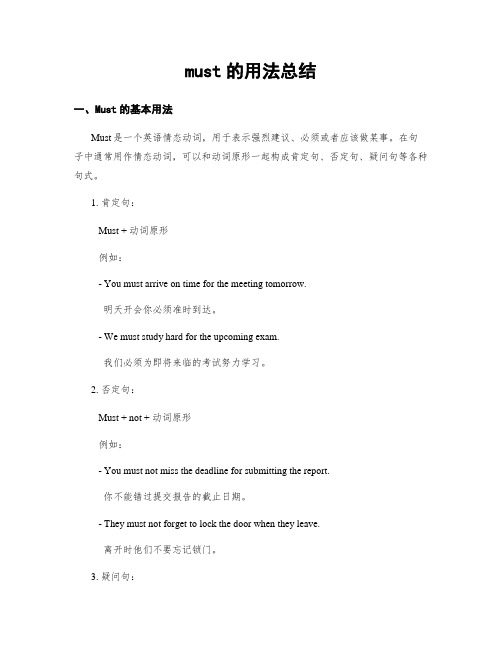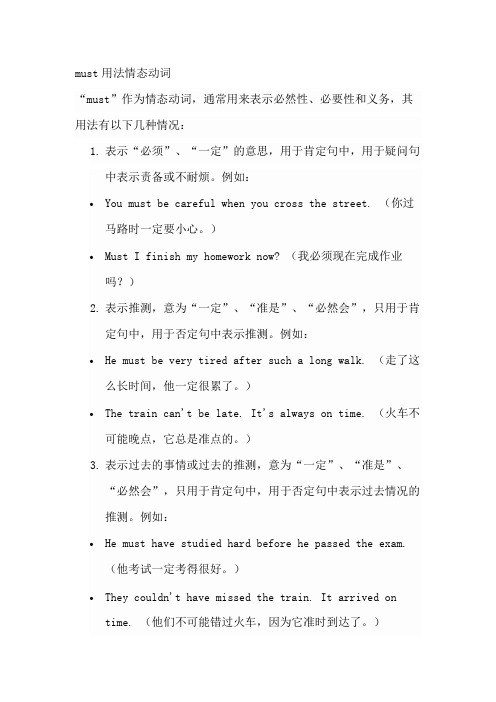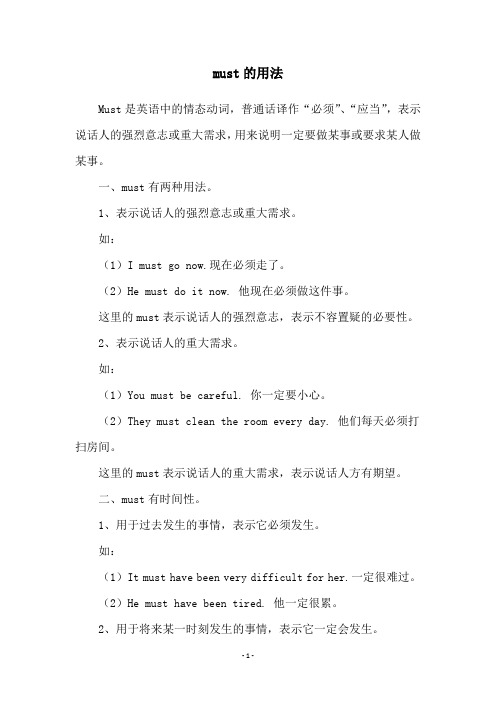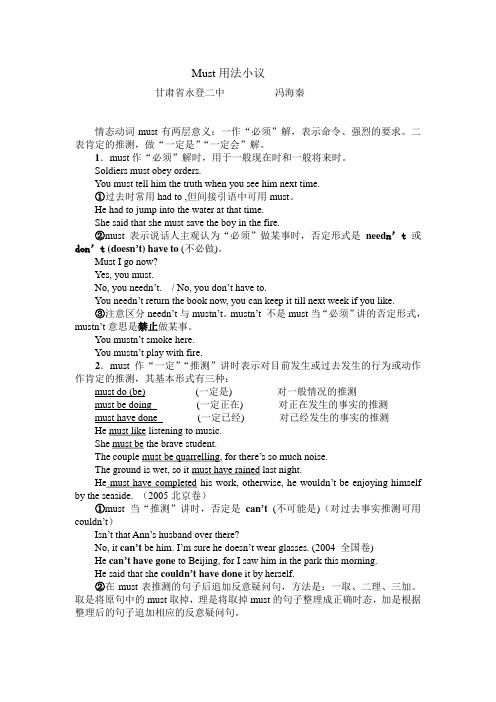must两种用法
情态动词must的用法总结

情态动词must的用法总结Must表示必须的时候,多是指现在或将来的情况,用来强调说话者的主观语气。
同时must也是表示有必要或有义务去做某事;must 表示推测的时候,多指有根据的推测,只能用于肯定句中,可以对现在、过去或者将来的情况进行推测。
扩展资料在英语中,情态动词must一共有两种含义,一种是表示必须;另一种是表示推测。
下面我们来看一下must不同含义时,不同的用法。
一、must表示必须的时候,多是指现在或将来的情况,用来强调说话者的主观语气。
同时must也是表示有必要或有义务去做某事。
对must表示必须时候的一般疑问句,肯定回答是用must;否定的回答是用don’t have to或者needn’t。
比如:You must listen to carefully in the English class.你必须在英语课上仔细听讲。
I must finish it in the night.我必须在晚上完成这件事。
He must to help other finish the homework.他必须帮助其他学生完成作业。
当must表示必须的时候,我们一定要注意区别must与have to。
这两者都可以表示必须。
must是指说说话者的意识,强调的是主观性,而have to是指外界的客观情况,强调的是客观性。
比如:You know you must finish the homerwork tonight.你知道的,你必须在今天晚上完成你的作业。
(强调主观意愿)You have to finish homework when your teacher receive it.当你的老师收作业的'时候,你不得不完成作业。
(强调客观情况)二、must表示推测的时候,多用来指有把握的、有根据的推测。
Must表示推测的时候只能用于肯定句中,可以对现在、过去或者将来的情况进行推测。
比如:The book must be Tom, it has his name on it.这本书一定是汤姆的,上面有他的名字。
must的用法

must的用法must有必须;应当;很可能的意思,那么你知道must的用法吗?下面跟着店铺一起来学习一下,希望对大家的学习有所帮助!must的用法:表示义务、意图或建议:必须,应该I must leave at six today. 我今天必须六点钟离开。
I must write a letter to the head teacher. 我非得给校长写封信不可。
(强烈意图)You must go and see that film——you'd really enjoy it. 你得去看看那部电影,你会真的喜欢它的。
(提建议)表示推测:必定,一定The light is still on, so he must be at home. 灯还是亮的,他一定在家。
The light was out. They must have gone to bed. 灯都熄了,他们必定睡了。
注意:1. must表示推测时的否定式是can't或couldn't(不可能) ,因为must只用于肯定句,语气很强。
2. 若对过去情况的推测用must have加过去分词。
表示主张:硬要,一定要If you must go, at least wait till the rain stops. 如果你坚持要走,至少也要等雨停了再走。
The machine must break down at this busy hour. 正忙的时候机器偏偏坏了。
表示不可避免性:必然要,必定会All men must die. 人总有一死。
“must+be”“must+be+ v -ing”“must+表示状态的动词”可表示现在或一般的情况; “must+have”表示过去的情况; “must+表示动作的动词”表示将来的情况。
must可表示讽刺或抱怨,此时须以you为主语。
must表示客观上不愉快的情况,意为“偏偏”。
情态动词must的用法

1、肯定式:must + V原; You must finish your homework. 2、 否定式:must + not + V原; You mustn’t smoke here.
must not表示禁止
3、疑问式:Must + 主语……?
—Must I clean the room once? 我必须马上打 扫房吗?
—Yes, you _m_u_s_t___. / No, you __d_o_n_’_t_h_a_v_e_t_o_/_n_e_ed_n_’_t____. 4.I got up late this morning, so I _h_ad__to_ take a taxi to school. 5. —Does she __h_a_v_e_t_o__ stay at home? —No, she doesn’t.
I had to clean my bedroom yesterday.
He has to work hard.
He doesn’t have to work hard.
-Does he have to work hard?
-Yes, he does./ No, he doesn’t.
请用must或have to的适当形式填空
—Yes, you must. 是的,你必须马上打扫。 —No, you don’t have to (=needn’t) . 不必啦。
在回答must引起的问句时,如果是否定的答 复,可用don’t have to或needn’t(不必) , 但不能用mustn’t
三、must 与have to 的区别
1、must 强调主观上认为“必须”做某事,而 have to 强调客观上要求“不得不”做某事。
must的用法及练习

must的用法及练习情态动词must 的用法1.must 表示必要性,“必须”(肯定句,疑问句常见)Must I start at once?例题你必须现在睡觉。
_________________.2.否定式mustn’t 表示“禁止”例题不许我们再迟到了。
_________________3.由must 引导一般疑问句时,肯定回答用must,否定回答用needn’t或don’t have to.---- Must I stay at home?---- Yes, you ___ / No, you _________________.4.当出现反问句式时,如果其陈述部分must 表示“必须,有必要”时,反问句用needn’t,如果其陈述部分mustn’t 表示“禁止”,反问句用must.例题①----You must go there, ______you?---- Yes, I must. / No, I needn’t/don’t have to.②You mustn’t go there, _________you?5.must 表示推测时,有3种形式时,反问句与must 后的动词保持一致。
⑴对现在的动作进行推测①You must be hungry now, aren’t you?②You must have the wrong number. There is no such person, haven’t/don’t you?⑵对正在进行的动作进行推测He must be doing his homework, isn’t he?⑶对过去发生的动作进行推测①You must have read this book, haven’t you?②It must have snowed yesterday, didn’t you?6.must 用于反语,表示劝诫。
-----Must you make so much noise?(你非得吵这么大声吗?) -----Sorry, I’ll try not to.例题John, look at the time, ___ you play the piano at such a later hour?A. mustB. canC. mayD. need7.与说话人的愿望相反,“偏偏,偏巧”。
must的用法总结

must的用法总结一、Must的基本用法Must是一个英语情态动词,用于表示强烈建议、必须或者应该做某事。
在句子中通常用作情态动词,可以和动词原形一起构成肯定句、否定句、疑问句等各种句式。
1. 肯定句:Must + 动词原形例如:- You must arrive on time for the meeting tomorrow.明天开会你必须准时到达。
- We must study hard for the upcoming exam.我们必须为即将来临的考试努力学习。
2. 否定句:Must + not + 动词原形例如:- You must not miss the deadline for submitting the report.你不能错过提交报告的截止日期。
- They must not forget to lock the door when they leave.离开时他们不要忘记锁门。
3. 疑问句:Must + 主语 + 动词原形?例如:- Must we finish this task by tomorrow?我们必须明天完成这项任务吗?- Must I bring my own laptop to the workshop?我必须带自己的笔记本电脑参加研讨会吗?二、Must的用法总结1. 表示根据道德规范或者法律规定必须做或者不做某事。
例如:- You must obey the rules of the library.你必须遵守图书馆的规定。
- Citizens must pay taxes on time.公民必须按时缴纳税款。
2. 表示根据逻辑、常识或者经验判断,某种行为是非常确凿的真理或者必然的结果。
例如:- The sun must rise in the east and set in the west.太阳肯定从东方升起,西方落下。
- You must be tired after working for such a long time.在工作了这么长时间之后,你一定累了。
must用法情态动词

must用法情态动词“must”作为情态动词,通常用来表示必然性、必要性和义务,其用法有以下几种情况:1.表示“必须”、“一定”的意思,用于肯定句中,用于疑问句中表示责备或不耐烦。
例如:•You must be careful when you cross the street. (你过马路时一定要小心。
)•Must I finish my homework now? (我必须现在完成作业吗?)2.表示推测,意为“一定”、“准是”、“必然会”,只用于肯定句中,用于否定句中表示推测。
例如:•He must be very tired after such a long walk. (走了这么长时间,他一定很累了。
)•The train can't be late. It's always on time. (火车不可能晚点,它总是准点的。
)3.表示过去的事情或过去的推测,意为“一定”、“准是”、“必然会”,只用于肯定句中,用于否定句中表示过去情况的推测。
例如:•He must have studied hard before he passed the exam.(他考试一定考得很好。
)•They couldn't have missed the train. It arrived on time. (他们不可能错过火车,因为它准时到达了。
)4.表示强烈的建议或命令,意为“必须”、“一定要”,用于肯定句中,用于否定句中表示强烈的不满或抱怨。
例如:•You must come to see me before you leave. (你一定要在离开前来看我。
)•You mustn't forget to turn off the lights before you leave. (你千万不要忘记关灯。
)5.表示推测或可能性的程度,意为“大概”、“或许”、“极有可能”,用于肯定句中,用于否定句中表示不太可能的推测。
must的用法及短语

must的用法及短语一. must的用法1. must作为助动词,表示强烈的义务或需要,常用于肯定句中。
例如:- You must submit your assignment by Friday.(你必须在星期五前提交你的作业。
)- We must always follow the safety instructions.(我们必须始终遵守安全说明。
)2. must可以用于表示推测或断定某事是非常可能发生的。
例如:- It's midnight, and she's not home yet. She must be stuck in traffic.(现在已经半夜了,而她还没回家。
她一定被堵在交通堵塞里了。
)- He hasn't eaten anything all day. He must be starving.(他整天都没有吃东西。
他一定饿坏了。
)3. 在过去的时态中,must有两种形式:must和had to。
- must用于表达过去时态中主观的推测、肯定意愿或授权。
例:He said his parents and sister would visit him that day, so he knew he must clean his apartment.他说他父母和姐姐可能那天会来看望他,所以他知道自己得打扫公寓。
- had to用于表达过去时态中不由选择、不得不做某事。
例:I had no other option but to ride my bike to work when my car broke down.我的车坏了,我别无选择只能骑自行车上班。
二. must的常用短语1. must-see:必看的- The Grand Canyon is a must-see if you're ever in Arizona.(如果你曾经在亚利桑那州,大峡谷是必看的)- My friend recommended a must-see movie that just came out in theaters.(我的朋友推荐了一部最新上映并值得一看的电影。
must的用法和固定搭配

must的用法和固定搭配一、介绍Must是一个常用的情态动词,它在英语中有着多种用法和固定搭配。
本文将重点讨论must的用法和固定搭配,并提供相关例句来帮助读者更好地理解该词的使用。
二、表示义务或强烈建议1. 表示必须做某事:当我们想要表达某个行为是必须要做的,就可以使用must。
例如:- You must hand in your assignment by tomorrow.(你必须在明天之前交作业。
)- We must follow the school rules.(我们必须遵守学校规定。
)2. 表示强烈建议:当我们想向他人提出明确的建议时,也可以使用must。
例如:- You must try this restaurant, the food is amazing!(你一定要去尝试这家餐厅,食物非常美味!)- I think you must read this book, it's very informative.(我认为你一定要读这本书,它非常有价值。
)三、表示推断或肯定性1. 表示推断:当我们根据某种证据或迹象作出合理的推测时,可以使用must表达对某件事情的推断。
例如:- It's already 10 o'clock, he must be asleep now.(现在已经十点了,他肯定在睡觉。
)- The road is wet, it must have rained earlier.(路面潮湿,肯定之前下过雨。
)2. 表示肯定性:当我们想要强调某个陈述的真实性时,可使用must来表示确定或确信的态度。
例如:- He's been studying very hard, he must be well-prepared for the exam.(他一直努力学习,一定准备好考试了。
)- Despite his young age, he must be very talented to play the piano so well.(尽管他年纪还小,但他一定很有天赋才能演奏得这么好。
must的用法

must的用法Must是英语中的情态动词,普通话译作“必须”、“应当”,表示说话人的强烈意志或重大需求,用来说明一定要做某事或要求某人做某事。
一、must有两种用法。
1、表示说话人的强烈意志或重大需求。
如:(1)I must go now.现在必须走了。
(2)He must do it now. 他现在必须做这件事。
这里的must表示说话人的强烈意志,表示不容置疑的必要性。
2、表示说话人的重大需求。
如:(1)You must be careful. 你一定要小心。
(2)They must clean the room every day. 他们每天必须打扫房间。
这里的must表示说话人的重大需求,表示说话人方有期望。
二、must有时间性。
1、用于过去发生的事情,表示它必须发生。
如:(1)It must have been very difficult for her.一定很难过。
(2)He must have been tired. 他一定很累。
2、用于将来某一时刻发生的事情,表示它一定会发生。
如:(1)You must leave tomorrow. 你明天必须离开。
(2)I must be back by three oclock. 三点前我必须回来。
三、must可以用于疑问句和否定句。
1、用于疑问句,表示确信地询问对方的意见或要求对方的决定,人称代词要改成疑问代词。
如:(1)Must I go now?现在必须走吗?(2)Must we do it now?们现在必须做这件事吗?2、用于否定句,表示说话人拒绝做某事或为保持一定的语气。
如:(1)You must not go there. 你不该去那里。
(2)I must not forget to do it.不可以忘记做这件事。
以上所述是must的用法,必须牢记must有两种用法,有时间性,可以用于疑问句和否定句,以便更准确地使用must这个词。
must用法小议

Must用法小议甘肃省永登二中冯海秦情态动词must有两层意义:一作“必须”解,表示命令、强烈的要求。
二表肯定的推测,做“一定是”“一定会”解。
1.must作“必须”解时,用于一般现在时和一般将来时。
Soldiers must obey orders.Y ou must tell him the truth when you see him next time.①过去时常用had to ,但间接引语中可用must。
He had to jump into the water at that time.She said that she must save the boy in the fire.②must 表示说话人主观认为“必须”做某事时,否定形式是need n’t或don’t (doesn’t) have to (不必做)。
Must I go now?Y es, you must.No, you needn’t. / No, you don’t have to.Y ou needn’t return the book now, you can keep it till next week if you like.③注意区分needn’t与mustn’t。
mustn’t 不是must当“必须”讲的否定形式,mustn’t意思是禁止做某事。
Y ou mustn’t smoke here.Y ou mustn’t play with fire.2.must作“一定”“推测”讲时表示对目前发生或过去发生的行为或动作作肯定的推测,其基本形式有三种:must do (be) (一定是) 对一般情况的推测must be doing (一定正在) 对正在发生的事实的推测must have done (一定已经) 对已经发生的事实的推测He must like listening to music.She must be the brave student.The couple must be quarrelling, for there’s so much noise.The ground is wet, so it must have rained last night.He must have completed his work, otherwise, he wouldn’t be enjoying himself by the seaside. (2005北京卷)①must当“推测”讲时,否定是can’t (不可能是)(对过去事实推测可用couldn’t)Isn’t that Ann’s husband over there?No, it can’t be him. I’m sure he doesn’t wear glasses. (2004 全国卷)He can’t have gone to Beijing, for I saw him in the park this morning.He said that she couldn’t have done it by herself.②在must表推测的句子后追加反意疑问句,方法是:一取、二理、三加。
must用法详解总结

must用法详解总结今天给大家带来must用法详解,我们一起来学习吧,下面就和大家分享,来欣赏一下吧。
must用法详解1. 表示“必须”、“一定要”(1) 可用于肯定句、否定句或疑问句;用于否定句时,mustn’t 的意思是“一定不要”、“不能”,而不是“不必”。
如:You must finish it today. 你一定要在今天完成它。
You must see the doctor. 你一定要看医生。
Must you go so soon? 你一定得这么早就走吗?We mustn’t think only of ourselves. 我们可不能只考虑自己。
(2) 主要表示现在或将来,但有时(如在间接引语中)也可表过去(=had to)。
如:She asked if she must (had to) leave. 她问她是否一定要离开。
(3) 对于must 开头一般疑问句,若要作否定回答,可用needn’t、dont have to,不用mustn’t。
如:"Must I come over tonight?" "No, you needn’t." “我今晚必须过来吗?”“不必。
”(4) 其后可接被动结构或进行形式。
如:Something must be done to stop it. 必须采取措施来阻止它。
I think I must be going. 我想我得走了。
2. 表示推测意为“准是”、“一定是”,注意以下几点。
如:(1) 通常只用于肯定句,在否定句或疑问句用can 代之。
如:It must be true. 那一定是真的。
比较。
如:Can it be true? 那可能是真的吗? / It can’t be true. 那不可能是真的。
(2) 后接动词原形,表示对现在情况的推测。
如:He must be wrong. 他一定错了。
The man must have a lot of money. 这个人一定有不少钱。
英语中情态动词must的用法

千里之行,始于足下。
英语中情态动词must的用法
情态动词must在英语中有以下几种用法:
1. 表示义务或责任:用于表示必须做或完成某件事情时。
例如:We must finish the project by tomorrow.(我们必须在明天之前完成这个项目。
)
2. 表示很有可能发生的事情:用于表示根据某种情况或判断,某种情况是非常有可能的。
例如:She must be tired after working all day.(她整天工作后肯定很累。
)
3. 表示推断或肯定:用于表示一种推断或确定的态度。
例如:It must have been difficult for him to make that decision.(对他来说做出那个决定肯定很困难。
)
4. 表示强烈的建议或命令:用于表示强烈的建议或命令。
例如:You must be on time for the meeting.(开会你必须准时。
)
5. 表示客观事实或必然性:用于表示一种客观的事实或必然性。
例如:The sun must rise in the east.(太阳必然从东方升起。
)
需要注意的是,must的否定形式是must not或mustn't,缩写形式是mustn't。
第1页/共1页。
Must用法

Must用法情态动词must有两层意义:一作“必须”解,表示命令、强烈的要求。
二表肯定的推测,做“一定是”“一定会”解。
1.must作“必须”解时,用于一般现在时和一般将来时。
As a soldier, you must obey orders.You must tell him the truth when you see him next time.①过去时常用had to ,但间接引语中可用must。
He had to jump into the water at that time.She said that she must save the boy in the fire.②must 表示说话人主观认为“必须”做某事时,否定形式是need n’t或don’t/ (doesn’t) have to (不必做)。
Must I go now?Yes, you must.No, you needn’t. / No, you don’t have to.You needn’t return the book now, you can keep it till next week if you like.③注意区分needn’t与mustn’t。
mustn’t 不是must当“必须”讲的否定形式,mustn’t意思是禁止做某事。
You mustn’t smoke here.You mustn’t play with fire.2.must作“一定”“推测”讲时表示对目前发生或过去发生的行为或动作作肯定的推测,其基本形式有三种:must do (be) (一定是) 对一般情况的推测must be doing (一定正在) 对正在发生的事实的推测must have done (一定已经) 对已经发生的事实的推测He must like listening to music.She must be the brave student.The couple must be quarrelling, for there’s so much noise.The ground is wet, so it must have rained last night.He must have completed his work, otherwise, he wouldn’t be enjoying himself by the seaside.①must当“推测”讲时,否定是can’t (不可能是)(对过去事实推测可用couldn’t)Isn’t that Ann’s husband over there?No, it can’t be him. I’m sure he doesn’t wear glasses. (2004 全国卷)He can’t have gone to Beijing, for I saw him in the park this morning.He said that she couldn’t have done it by herself.②在must表推测的句子后追加反意疑问句,方法是:一取、二理、三加。
must的用法

She is not at home. She must be out. 她不在家里,她一定外出了。
注意:must表示推测,用于反意疑问句时,疑问部分不能用must, 应与其后面的动词保持一致。如:
(1)She must be home, isn’t she? 她一定在家里,是吗?
must是情态动词,没有人称或数的变化,后接动词原形,其主要用法如下:
1.表示义务或必要性,意思是“应该、必须”,通常用于肯定句及疑问句。如:
You must go to bed now. 你现在必须睡觉了。
Must I start at once? 我必须立刻出发吗?
—Must I stay at home? 我必须留在家留在家里。
(No, you needn’t. 或No, you don’t have to.)(不,不用了。)
如果是反意疑问句,疑问部分一般不用needn’t, 而用mustn’t;否定回答时仍用needn’t, don’t need to或don’t have to. 如:
2.must的否定式是must not/ mustn’t,意思是“不应该、禁止”,语气较强烈。如:
You must not smoke here. 你不许在这里吸烟。
We mustn’t be late again. 我们不应该再迟到了。
3.由must引出的一般疑问句,肯定回答用must,否定回答用needn’t, don’t need to或don’t have to均可,但不用mustn’t,因为mustn’t表示“不许、禁止”的意思,与问句的原意不符。如:
(2)Tom must have a sister, hasn’t he? / doesn’t he? 汤姆肯定有一个妹妹,是吗?
Must的用法

must的用法must 意思是“必须”,主要表示义务和强制,用于提建议时语气直接、强硬。
常见形式有:must (必须/一定要) ,must always (一定总要),mustn't (一定不要/不能),must never (永远不能/千万不能) 。
(1) You must keep the key in your pocket.你一定要把钥匙放在衣袋里。
(2) You mustn't go through a park alone at night.夜间你一定不要独自一人穿过公园。
(3) You must never say that again.千万不要再说那样的话了。
常用词汇anti-drug 禁毒drug addicts 吸毒者rehabilitation centre 戒毒所drug dealer 贩毒者drug traffic 毒品贩运Golden Triangle 金三角narcotics 毒品,麻醉品opium 鸦片heroin 海洛因cocaine 可卡因marijuana 大麻Iraq 伊拉克oil-for-food plan 石油换食品计划arms inspection 武器核查lift sanctions on 撤消制裁Asia's financial crisis (turmoil) 亚洲金融危机(动荡)renew most-favored nation (MFN) status 延长最惠国待遇World Environment Day (WED) 国际环境日For Life on Earth--Save Our Seas 为了地球上的生命,拯救我们的海洋(口号)The State Environmental Protection Administration 国家环保局environmental protection 环境保护environmental pollution 环境污染soil erosion 水土流失desertification 沙漠化ecological damage 生态破坏deterioration of ecological environment 生态环境的恶化water-soil conservation 水土保持acid rain 酸雨sculpture dioxide discharge 二氧化硫排放forest coverage rate 森林覆盖率Peace and development have become the main current in today's world. 和平与发展已成为当今世界的主流。
must的用法

must的用法must有必须;应当;很可能的意思,那么你知道must的用法吗?下面跟着店铺一起来学习一下,希望对大家的学习有所帮助!must的用法:表示义务、意图或建议:必须,应该I must leave at six today. 我今天必须六点钟离开。
I must write a letter to the head teacher. 我非得给校长写封信不可。
(强烈意图)You must go and see that film——you'd really enjoy it. 你得去看看那部电影,你会真的喜欢它的。
(提建议)表示推测:必定,一定The light is still on, so he must be at home. 灯还是亮的,他一定在家。
The light was out. They must have gone to bed. 灯都熄了,他们必定睡了。
注意:1. must表示推测时的否定式是can't或couldn't(不可能) ,因为must只用于肯定句,语气很强。
2. 若对过去情况的推测用must have加过去分词。
表示主张:硬要,一定要If you must go, at least wait till the rain stops. 如果你坚持要走,至少也要等雨停了再走。
The machine must break down at this busy hour. 正忙的时候机器偏偏坏了。
表示不可避免性:必然要,必定会All men must die. 人总有一死。
“must+be”“mu st+be+ v -ing”“must+表示状态的动词”可表示现在或一般的情况; “must+have”表示过去的情况; “must+表示动作的动词”表示将来的情况。
must可表示讽刺或抱怨,此时须以you为主语。
must表示客观上不愉快的情况,意为“偏偏”。
- 1、下载文档前请自行甄别文档内容的完整性,平台不提供额外的编辑、内容补充、找答案等附加服务。
- 2、"仅部分预览"的文档,不可在线预览部分如存在完整性等问题,可反馈申请退款(可完整预览的文档不适用该条件!)。
- 3、如文档侵犯您的权益,请联系客服反馈,我们会尽快为您处理(人工客服工作时间:9:00-18:30)。
1. Children under 12 years of age in that country ________ be under adult supervision when in a public library. (上海卷)
A. must B. may
C. can D. need
【分析】答案选A。must表示强制性,意为“必须、应当”。
2. —Who is the girl standing over there?
—Well, if you ________ know, her name is Mabel. (天津卷)
C. may D. shall
【分析】答案选D。在规章中告诫应考者,在收完所有试卷前“必须”留在教室里。
■should的用法
should除表示推测外,还可表示责任或义务,“应该,应当”;用于条件句表示“万一”;还可表示“竟然”等。如:
A. should B. might
C. would D. could
【分析】答案选A。should表示一种责任或义务,“应该”。
■shall的三种用法
①表示说话人的意图。主语可以是任一人称,表示说话者给对方的承诺、决心、警告、威胁等;②表示强制。用于法令、条约、规章中,意为“必须,应该”;③征求对方意见。用于主语是第一、三人称的疑问句中,意为“要不要…?”“…好吗?”如:
1. — Excuse mc, but I want to use your computer to type a report.
【分析】答案选A。shall表示说话人给予对方以警告(from )。
2. “The interest ________ be divided into five parts according go the agreement made by both sides,” declared the judge. (重庆卷)
Will you post the letter for me, please?请帮我把这封信寄出去好吗?
③表示习惯,仅用于陈述句。如(from ):
She will listen to records, alone in her room, for hours. 她常常独自一人在自己的房间里呼唱片,一听就是半天。
情态动词用法补充
■must的两种用法
1. 表示必要性可强制性,“必须,应当”。其过去式可用had to;否定式可用needn’t或don’t have to (不必) 等;mustn’t是may的否定式,意为“不允许,不可以,千万不”,表示禁止。2. 表示坚持,“硬要,偏要,一定要”。如:
—You ________ have my computer if you don’t take care of it. (湖南卷)
A. shan’t B. might not
C. needn’t D. shouldn’t
A. may B. should
C. must D. shall
【分析】答案选D。shall表示条约的规定,意为“必须”。句意是:法官宣布“根据双方所订的协约,利息必须分成五份。”
—Which ________ do yourself? (全国卷)
A. do you rather B. would you raer D. should you rather
A. forget B. forgot
C. forgetting D. to forget
【分析】答案选A。因为better是had better的省略形式,后面要接动词原形。
3. Johnny, you ________ play with the knife, you ________ hurt yourself. (全国卷)
A. won’t; can’t B. mustn’t; may
A. may B. can
C. must D. shall
【分析】答案选C。must表示坚持,“一定要、非得”。
1. I often see lights in that empty house. Do you think I ________ report it to the police? (广西卷)
A. should B. may
【分析】答案选B. would rather do sth. 意为“宁愿做某事”;其中would不可用should或其它助动词代替;其疑问式是将would提到主语前。
2. If you are planning to spend your money having fun this week, better ________ it—you’ve got some big bills coming. (广东卷)
C. shouldn’t; must D. can’t; shouldn’t
【分析】答案选B。mustn’t(千万不)表示禁止;may表示可能性。句意为“你千万不要玩刀子,可能会弄伤自己的。”
注:must与have to的比较:have to却有更多的时态形式;must强调主观看法,而have to更强调客观要求;询问对方意图时用must, 即:Must I…?
■had better和would rather的用法
两者后均接动词原形,否定式在原形前加not;在否定问句和反意问句中可用hadn’t / wouldn’t。对长辈或上级说话时,不宜使用。had better在口语中常说成’d better, 甚至better。如:
1. —Shall we go skating or stay at home?
■will和would的用法
①表示意志,愿望和决心,意为“愿意”,可用于条件句。如:
If you will allow me, I will see you home. 如果你愿意,我送你回家。
②表示请求。可用Will / Would / Won’t / Wouldn’t you…?“请…”“…好吗?”但回答时不用would。如:
3. It has been announced that candidates(应考者) ________ remain in their seats until all the papers have been collected. (上海卷)
A. can B. will
④表示真理或事物的品质,还可表示“能够”。如:
Oil will float on water. 油能浮在水面上。
Accidents will happen. 事故总是难免的。
That container will hold a gallon. 那容器能够装一加仑。
The wood will not burn. 这木材无论如何也烧不着。
C. will D. can
【分析】答案选A。我常发现那座“空房有灯”这种异常现象,所以问你我“该不该”将此现象报告警察,因此,用表示责任或义务的should。
2. I ________ pay Tracy a visit, but I am not sure whether I will have time this Sunday. (浙江卷)
